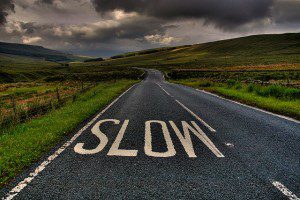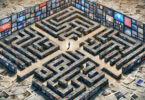By Chris Thomson
Guest writer for Wake Up World
Less is not more, as is often claimed. More is more! That said, less is often better, and that can make all the difference in today’s world, a world that is getting faster, fuller, and more pressing.
Our world is getting faster in terms of the pace of life, the speed of transport, the speed of communications and the speed of change. Although speed can bring benefits, it can also bring stress and cause accidents and mistakes. If we want to live well in a faster world, we need to go more slowly in our own personal world. There are times when less rush would mean better progress.
The world is getting fuller in the sense that there are more things in it than ever before, more things to buy in shops, more technology to use, more movies to watch, more books and magazines to read, more music to listen to, and more content on the internet. As if this were not enough, we have much more knowledge available to us, and many more things to do with our leisure time. Just as important, we have more of us. The human population is growing at the rate of about 228,000 per day. This is almost exactly 7 million more people in the world every month, and the rate is accelerating. One thing is clear to me – if we want to live a happy, healthy life in such a full world, we have to create space in our own personal world.
The world is also getting more pressing. There are more pressures than ever on us to work harder, to consume more, to be constantly active, and to be glued to technology. It is not just this – pressures also come in the form of noise, pollution, anti-social behaviour, aggressive marketing, as well as having to live in a world run by politicians who are often in service to big money. To be able to live well in such a world, we have to try to create the opposite of pressure in our own personal world.
Why is all this happening? Why is the world getting faster, fuller and more pressing? There is no single easy answer to this. There are many factors. However, I suspect that one of the main causes is the widespread belief that “more is better”. It is a belief that influences our lives more than we might imagine. At the national level, it is reflected in the overwhelming importance given to economic growth, the idea that having more money and things is intrinsically desirable. At the business level, it can be seen in the imperative to make as much money as possible, often at the expense of people and the planet. As a consequence, business is often part of the problem, when it should be part of the solution. And at the level of the individual, a lot of people seem to believe that having more money and things will make them happier.
I am not saying that “more is better” is always a bad thing. There are many occasions when more really is better, especially when people do not even have the basics of life. And it is clear that we need more peace, more honesty, more wisdom, and more love in the world. However, I believe that we have too many of the wrong things and not enough of the right things. And it is clear to me that many, if not all, of our big problems can be traced back, one way or another, to the belief that more is better:
- All the planet’s life support systems are in decline, i.e. clean air, clean water, forests, topsoil, aquifers, fisheries, wetlands, and biodiversity. This is because we overuse and abuse them. And we do this because, in a “more is better” world, we want too much, do too much, and use too much.
- The climate is changing dangerously for precisely the same reasons.
- Inequality is high and rising, because a “more is better” society creates a few big winners and a very large number of losers.
- Democracy is under threat because the big winners exert disproportionate influence on politicians and policy.
- Wars are raging on three continents, because a “more is better” culture causes us to compete, often violently, for scarce resources.
- Mental and emotional illnesses are at record highs, because people are under immense pressure to work longer and harder, and to consume more and more, and because they feel, deep down, that there is no real meaning to this.
- Corruption and dishonesty are widespread because many people want even more than they already have, and they try to do this by cutting corners and bending the rules in their favour.
- Crises have become the norm in the world, because the prevalence of the belief that “more is better” has led to major systemic failures in our socio-economic institutions – economics, finance, business, government, health, and education.
This state of affairs is clearly unsustainable. Something big needs to change.
If I am correct, and the belief that “more is better” is at the root of our problems, or at least a main cause, then it is time to replace that belief with something very different.
Just try to imagine how your life, and the world, would be if the following were true:
- You do less, but you live better. You feel more alive, and more connected. You are a human being, rather than a human doing.
- You have less, but you enjoy more – because your focus is on the quality of things and experiences, rather than the quantity.
- You say less, but you communicate better. You speak (and write) less often and you use fewer words, yet you are better able to reach people and influence them. This may mean that you have fewer “friends”, but at least they will be real friends.
- You rush less, but make better progress. All of us can think of examples when we are in a great hurry, but this gets us there no faster.
- You make less effort, but get better results. By easing up, you bring into play the Law of Reverse Effort, which I will talk about shortly.
- You control less, and trust more. This often makes things easier and more successful.
- You expect less, but receive more – including pleasant surprises.
I would like to say a few words about each of these themes.
Doing Less is Better
It is quite common these days to see someone walking with ski-poles, listening to an iPod, with a dog on the end of a lead. It is equally common to come across someone drinking coffee, with her laptop open, speaking on her mobile phone, while having a conversation with someone across from her. Some people call this “multi-tasking”. I prefer to think of it as “doing too much”. It was not always like this. I can remember a time when people did much less, but were much happier.
Of course, it is true that there are many important things to be done today. This is why people feel drawn to working with an NGO or something similar, so that they can contribute to making the world a better place. There is nothing wrong with this. Yet the fact is that the world’s problems just keep on increasing. Despite the vast amount of time and energy we put into solving problems, we are barely making a dent in them. Unless we change something really fundamental, there will always be too much to do, because we are creating problems faster than we are solving them. Perhaps it has something to do with the fact that we focus too much on the quantity of our activity, and not enough on the quality.
When I was growing up, in the 1950s, we were told that life would be much easier in the future. We would have more free time. We would work far fewer hours. And life would be much less stressful. The opposite has happened. I look around and see a lot of stress, and I see people working longer and harder than ever. There are many reasons why we do too much. Here are some of them:
- Social pressures – we feel that we should be doing all kinds of things for our children. And we also feel that, in order to “get on in life”, we need to work long and hard.
- Work pressures – your colleagues do it, therefore so should you. And “doing” gives the impression that you are working. It has to be significant that sitting quietly, thinking, is not regarded as real work, even though it may often be the most useful thing you could do.
- Wasting time – life is short, so we have to make the most of it. And that means doing as much as possible. Of course, there many things we could do, such as climbing Mount Everest, but we would end up drained and exhausted, burned out before our time.
- Anxiety – being busy is a common way of trying to keep anxiety at bay. It may seem to help for a while, but it does not work in the long term.
Obviously, if you are an employee or if you have your own business, there are some things you just have to do. That much is clear. Yet it is a tragedy that so many people spend so much of their lives doing things they dislike, or even hate. That said, there is much that many of us can do to reduce the quantity of our activity, and raise the quality.
One very quick, effective way to become less of a human doing and more of a human being is to move less. Yes, just move less! If this seems an odd thing to say, this is only because most of us are not accustomed to the idea of just doing nothing. We have been conditioned to be active all the time. And it’s chicken and egg – we are constantly agitated, unable to be still for long, and uncomfortable when nothing seems to be happening. So, just try it! Try moving less. If you are not sure what that means, just try sitting still, doing nothing, for at least half an hour. The longer you can do this, the more powerful it is.
Meanwhile, it might be helpful to list some of the benefits of doing less:
- You save energy and time.
- You are less likely to deplete the planet’s resources.
- Your moments of peace and inactivity will help you become more effective in your life and work.
- You will be doing only the things that are really important to you.
Have Less, Enjoy More
If everyone consumed as much as the typical American, we would need four planets to provide the space and resources to make this possible, perhaps even more than four planets when we factor in obesity! We clearly do not have four planets, so why does the human population continue to grow so rapidly, and why do so many people continue to advocate perpetual economic growth, which means producing and consuming more and more? The answer to these questions runs very deep, not least because the belief that we need perpetual economic growth has become almost religious, a self-evident truth, about which there can be no argument. While it is true that there are still many people who do not even have the basic necessities of life, billions of people now have far more than they need, yet they want even more. “Affluenza” has become one of the epidemics of the modern world. It has clearly afflicted China in a big way.
For some people, more is never enough. It is interesting to reflect that one of the fastest growing industries, in the USA and elsewhere, is the self-storage industry. Although some people use self-storage units to keep things while they look for a new home, many use the facilities to store things because they have no more room at home. They have too much stuff. But this does not deter them. They continue to accumulate things, some of which they never use, and some they will never see again (because they are stored away). Having too much is not good for you, because it does not make you happy. It is not good for your pocket, and it is obviously not good for the planet. So why do we want so much and why do we keep on acquiring more when we already have too much? Here are some of the reasons:
- Availability – we do it because stuff is so available, in shops, on the internet, and in a variety of other ways, such as car-boot sales. We buy stuff that we do not need, and we buy it even when we cannot afford it, running up a lot of debt.
- Cult of the new – sometimes I feel that I have lost count of the number of times a new iPhone has been launched, each time with a fanfare of publicity. If the previous model was so good, as is claimed each time by Apple, why replace it so soon? The fact is that many people feel compelled to have the latest technology or the latest product, regardless of how well their current technology or product functions.
- Anxiety (again!) – retail therapy, as it is often called, has become a huge phenomenon. People feel not the slightest tinge of embarrassment as they “shop until they drop”. I believe that much of this is caused by anxiety or insecurity, and that the act of shopping makes people feel better for a short while. However, that feeling quickly wears off.
- Social pressures – it used to be called “keeping up with the Joneses”. If they have it, we have to have it too! Perhaps it has gone even further than that today. Perhaps now it is a case of “I shop, therefore I am.”
- Confusing needs with wants – Abraham Maslow wrote about a “hierarchy of needs”. It shows that we have some very basic needs, without which we will die. Beyond that, there are other needs that are not physically essential, but which are important emotionally. However, our needs are not the same as our wants. These can be defined as “It would be nice if I had it, but my world will not collapse if I don’t.” It is clear that many people today are confused about needs and wants, and consequently acquire far too much.
We live in a very materialistic world where consumerism is the new religion, shopping malls are the new cathedrals, and financial experts the new high priests. However, there is widespread awareness that this is unsustainable, and certainly not making us happy. The people of Bhutan are mostly Buddhists, so they are aware of the Second Noble Truth – attachment to desire is the root of all suffering. They know that the endless quest for more money and things (i.e. economic growth) is a collision course with disaster, which is probably why they have made happiness their national purpose. They call it Gross National Happiness. Even the World Bank has taken an interest in an initiative. I hope that this is a sign of better things to come.
So what is the cure for “affluenza”? As with influenza, there is no simple cure. It is not easy to want less and have less. It takes courage and strength. My simple recommendation is that you try to “declutter” your life, by getting rid of things that you do not really need. You might be surprised at much stuff you have that you never use, and never will use.
Say Less, Communicate Better
Just to remind you, I advocate a healthy balance between too much and too little. There are clearly some situations where saying more is the right thing to do, as for example when you have a lot of things bottled up inside you that need to be expressed, or when you really need to explain something fully. My sense, however, is that many of us say too much, and we often say it badly.
We have never had so many opportunities to communicate. You probably have a mobile phone, a laptop or tablet, and one or more email accounts, and you may be in habit of using Skype. Perhaps you also have a website or a blog, not to mention your presence on Facebook and Twitter. You can communicate all day, to virtually anyone, anywhere. As if this were not enough, you have access to hundreds of TV channels and newspapers. We are undoubtedly communicating more. But are we communicating better? I very much doubt it.
- Meetings – many meetings are unnecessary, and many are too long. Some people speak too much, others speak too little, while some speak only because they feel they have to. We would all benefit from fewer, shorter, more effective meetings.
- Reports – they are often too long and badly written. Many take 20 pages to say what could be better said in two.
- Emails – they too are often too long, unnecessary, and badly written. It could be because people do not really know what they want to say. It could be because they are in too much of a rush. Or perhaps it is just because they no longer care about the quality of their writing.
- Mobile phones – I probably do not need to say anything about this!
What we say and how we say it can determine the success or failure of important things in our life – our relationships, our happiness, our work, and our finances. It is not the quantity of communication that matters, but the quality. So why do we chatter so much? As always, there are several reasons.
- Uncomfortable with silence – in a busy, noisy world, silence has become a rare luxury for many of us. Yet peace and quiet are surely necessary for good health and for a good quality of life. The problem is that many of us are so accustomed to noise that silence makes us feel uncomfortable. So we may feel compelled to “fill the space” with sound, by speaking a lot or playing loud music.
- Society values quantity – so we write long reports and give long presentations, when shorter would usually be better. As you know, consultants are often paid for the time spent on a project, rather than for the quality of the result. No guesses for what sometimes happens!
- Anxiety – this keeps popping up! All of us get anxious from time to time. A common response to anxiety is to talk a lot. And we all know how irritating that can be.
- Pressures to speak – perhaps we feel we have to speak at a meeting, just to demonstrate that we are adding value, and thus earning our salary. Besides, there seems to be an unwritten rule that it is impolite to keep silent in the company of others. But why should we not able to enjoy silence together?
How to Say Less and Communicate Better

Many of us are nervous about speaking in public, particularly in front of a large audience, and few people write well. We would all benefit from becoming better speakers and writers. People would pay more attention to what we have to say. We would be able to get what we want, quicker and more efficiently. And, not least, we would feel better, as our self-confidence rises.
My suggestions are:
- Switch off your phone from time to time.
- Say less, and listen more, when you are in company.
- Write shorter (and fewer) emails and reports.
- Get into the habit of reading aloud from a book, slowly and clearly. You will be surprised at the effect this has.
- Buy a good pen, and practise your handwriting. Try to write elegantly. It may seem strange to hear this, but doing this can produce elegance inside you.
Rush Less, Make Better Progress
A group of North American Indian lawyers got together some years ago to start a project. The aim of the project is to get back all Indian lands illegally taken by the United States Government when it broke treaties. There is a lot of land involved. The lawyers expect this to be a 50-year project. Significantly, they say that they do not expect much to happen in the first 25 years of the project’s life. I love the slow power of this.
I can remember the time when 60 miles per hour in a car seemed quite fast. Today the same speed seems quite slow. I also remember when people wrote letters on paper to each other and then had to wait at least a day before they reached the recipient. It might surprise you to hear that this was a very efficient way to communicate. You had time to think about what you wanted to say, and you would not normally want, or expect, an immediate reply. So different today! Life is undoubtedly faster, but is it better because of this? In some respects, speed can be a good thing. For example, I love the high speed trains in Spain and France. However, overall, I have my doubts.
- Stress – driving fast can be exhilarating, but it can be stressful too. It can cause accidents, use more fuel and, as the research keeps telling us, does not get us to our destination that much sooner.
- Health – eating quickly is bad for us, both physically and culturally. Yet fast food, rushed meals, “grazing”, “eating on the hoof”, drinking coffee while driving, have all become commonplace.
- Premature action – who among us has not felt the acute discomfort of sending an email or text in haste, or to the wrong person?
- Bad decisions – typically, we make bad decisions when we rush.
When Slower is Better
You are not alone if you think that life has become too fast…
“The Slow Movement is a worldwide movement to recapture a state of connectedness. The movement is gaining momentum, as more and more people recognise their discomfort at the fast pace and disconnected nature of their lives.” (from The Slow Movement website)
There are many benefits from going slower…
- Enjoyment – the slower you go, the more you see and hear. And the more you see and hear, the more you enjoy. Just imagine travelling through the countryside on a motorway. And then imagine walking or cycling through it.
- Calm – we feel much calmer and more relaxed when we stop rushing.
- Communicating – when we speak slowly and clearly, people are much more likely to understand us and pay attention to us.
- Mistakes – you will almost certainly make fewer mistakes if you do things more slowly.
How to Stop Rushing
There are many things I could say about this. However, I will just tell you about my experience with a friend some years ago in France when he asked me to teach him how to ski. A good, intelligent man, he was very nervous and always on the go. He knew this and asked me to help become calmer. What I did was to help him adopt two new habits – walk more slowly and speak more slowly. That was all! After a few weeks we both agreed that it worked wonders. He felt much calmer inside, and on the outside he seemed much less nervous.
Try Less, Achieve More
There is a widespread belief that only by trying harder will we be successful. This belief takes many forms. In school reports, management appraisals, and in sport, we often encounter the words “good effort” or “must try harder”. People who work long and hard are highly valued by society and organisations, even when their work is of doubtful quality and efficacy. In addition, there is a belief that the mighty triumph. One need look no further than US foreign policy to doubt the wisdom of this belief. The reality is that trying less, with less effort, often produces better results. Although this may seem counterintuitive, even impossible, there are many examples of it in the natural and human worlds, when minimum input produces optimum output. This is sometimes called the Law of Reverse Effort, and it is intimately connected with something called “flow”.
One of the best known writers on the subject, Mihaly Csikszentmihalyi (usually called “Mike”, for obvious reasons), describes flow as “being completely involved in activity for its own sake. The ego falls away. Time flies. Every action, movement, and thought follows inevitably from the previous one, like playing jazz.” As a mountaineer and skier, I know exactly what he means. How wonderful it is when you are able to move effortlessly. Your body feels at one with the mountain. It was not always so! I well remember my early attempts to ski, in Mayerhofen, Austria. I spent more time on the ground than upright. The situation was not helped by Rudi, our instructor, shouting “Bend your knees. Lean out”, which were the last things my body wanted to do. But I persisted, and with the Pyrenees less than two hours away, I am now able to enjoy very pleasurable days, letting the mountain take me with it, rather than resisting it, as I used to. It is an odd thing, but the more you allow yourself to go with the mountain, the easier it is to ski. This is not to suggest that I am always “in the zone” – my ski-ing technique leaves a lot to be desired – but at least I have learned to go with the flow, and I am therefore able to ski long routes without getting too tired. You can apply the principle of “reverse effort” to anything. It does not matter where you are or what you are doing, when you allow yourself to go with the flow, everything gets easier and you are usually more successful.
How to use the Law of Reverse Effort
 In a world where effort is highly valued, it is not easy to go against the grain. It is not easy to “take your foot off the accelerator” and trust that you will get better results. Yet this is exactly what I suggest you do. Take your foot off the gas whenever you think you are doing too much, going too fast, or trying too hard. Only you will know what this means for you. Only you will know when you are putting in too much effort and not getting results. Whenever you have this feeling, just ease off! You don’t have to ease off completely – a 10% reduction can make all the difference. The important thing is that you feel you are making less effort, but still proceeding well. I am sure that this will bring benefits right across the board.
In a world where effort is highly valued, it is not easy to go against the grain. It is not easy to “take your foot off the accelerator” and trust that you will get better results. Yet this is exactly what I suggest you do. Take your foot off the gas whenever you think you are doing too much, going too fast, or trying too hard. Only you will know what this means for you. Only you will know when you are putting in too much effort and not getting results. Whenever you have this feeling, just ease off! You don’t have to ease off completely – a 10% reduction can make all the difference. The important thing is that you feel you are making less effort, but still proceeding well. I am sure that this will bring benefits right across the board.
Control Less, Allow More
We live a huge paradox these days. On the one hand, we try to control more and more aspects of our lives, by trying to minimise risks and by trying to know in advance what will happen in the future. At the same time, more and more aspects of our lives are being controlled by others – CCTV cameras everywhere, laws and regulations covering everything, political correctness, and government surveillance of our emails and telephone calls. On the other hand, the world seems to be spinning out of control, with its endless round of crises and problems. It feels as if the more we try to control, the more we lose control. By why do we try to control so much. As always, there are many reasons.
- We think we can control other people – we try to control how they vote, what they buy, what they believe, and how they behave. This works to some extent, because we live in an era of mass culture, mass media, and mass marketing. A lot of people are now aware of this and they are, in their different ways, resisting attempts to be controlled.
- We think we can control nature – you will be able to think of many examples of this, such genetic engineering, hydro-electric schemes, slimming pills, anti-ageing techniques, and so on. You will also be able to think of the problems this often causes.
- We think we can control danger – we have become very risk-averse in the last few decades. Not surprisingly, there has been an immense growth in the “security” industry over the same period. This has been accompanied by an “equipment revolution”, in which every sport, indeed virtually every activity, has its own range of equipment. In my own sport, mountaineering, we used to go climbing in old clothes, cheap “commando boots”, and a rope only if really necessary. These days people are literally covered in equipment. I doubt that it makes the world any safer for them. The risk-aversion has become so extreme that, in one case, a school in England did not allow parents to attend their children’s sports days, in case any of them were paedophiles, Bizarre, but true! The fact is that “danger” is often in the mind. It is often just a projection of our fears.
- We think we can predict the future – go to Google, type in “unsuccessful predictions”, and have some fun. The vast insurance industry is based on predictions. Business strategy is based on predictions. But life rarely works out the way we expect. As John Lennon said: “Life is what happens when you are busy making other plans.” The reality is that we can control the future as little as we can control the moon and stars.
The Wisdom of Uncertainty
Tibetans have a very sensible attitude towards worry and insecurity, and to our related need to try to control everything. They say that if you can solve a problem, why worry about it? And that if you cannot solve a problem, then there is no point in worrying about it. In both cases worry is useless. There is much wisdom in this. Removing worry from your life frees up a huge amount of energy for you, and makes you happier. But for many of us, worrying is the habit of a lifetime. So how do we break the habit? I suggest that you make two lists. In the first list write down all your problems that you think you can do something about. The other is a list of the problems that you think can do nothing about it. Now throw the second list away! Then look at the first list, choose one problem on it, and then do something about it right now. That immediate action may not be all you have to do, but at least you have set the process in motion. If you continue with this, addressing all the problems on the list in this way, two things will happen: you will solve your problems; and you will feel much better. In fact, a third thing will probably happen too. When you worry less, you will feel less need to control. And when you stop trying to control, you are much more likely to be able to “flow” through life.
Conclusion
I have taken you through this at some speed. Perhaps I should have gone more slowly! My intention is simply to give you a sense of the power, and scope, of “less is better”. In my experience, we can apply it to every aspect of our life and our work. When we do, it makes all the difference.
Also by this author:
- Navigating the Transition
- Four Planets – How Loud Does the Wake-Up Call Have To Be?
- Are We Still Evolving? The Future of Human Evolution
About the author:
Chris Thomson has worked as a lawyer, economist, researcher in Chinese, and as a director of think-tanks in Scotland and the USA. He now works as a writer, therapist and course leader. He facilitates courses including “A Course in Intelligence” and “Less is Better”. His book Full Spectrum Intelligence: A Practical Course on Behaving Wisely and Well (Changemakers Books) was published in 2014.
Chris lives in Catalonia, and also gets to the mountains as often as he can. He can be contacted via email at: [email protected].

If you've ever found value in our articles, we'd greatly appreciate your support by purchasing Mindful Meditation Techniques for Kids - A Practical Guide for Adults to Empower Kids with the Gift of Inner Peace and Resilience for Life.
In the spirit of mindfulness, we encourage you to choose the paperback version. Delve into its pages away from screen glare and notifications, allowing yourself to fully immerse in the transformative practices within. The physical book enriches the learning process and serves as a tangible commitment to mindfulness, easily shared among family and friends.
Over the past few years, Wake Up World has faced significant online censorship, impacting our financial ability to stay online. Instead of soliciting donations, we're exploring win-win solutions with our readers to remain financially viable. Moving into book publishing, we hope to secure ongoing funds to continue our mission. With over 8,500 articles published in the past 13 years, we are committed to keeping our content free and accessible to everyone, without resorting to a paywall.









